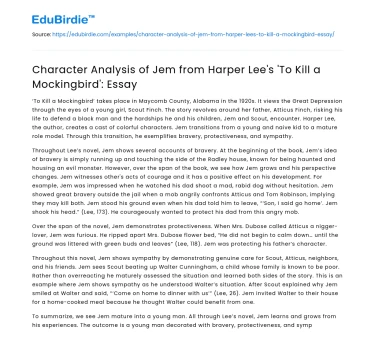‘To Kill a Mockingbird’ takes place in Maycomb County, Alabama in the 1920s. It views the Great Depression through the eyes of a young girl, Scout Finch. The story revolves around her father, Atticus Finch, risking his life to defend a black man and the hardships he and his children, Jem and Scout, encounter. Harper Lee, the author, creates a cast of colorful characters. Jem transitions from a young and naive kid to a mature role model. Through this transition, he exemplifies bravery, protectiveness, and sympathy.
Throughout Lee’s novel, Jem shows several accounts of bravery. At the beginning of the book, Jem’s idea of bravery is simply running up and touching the side of the Radley house, known for being haunted and housing an evil monster. However, over the span of the book, we see how Jem grows and his perspective changes. Jem witnesses other's acts of courage and it has a positive effect on his development. For example, Jem was impressed when he watched his dad shoot a mad, rabid dog without hesitation. Jem showed great bravery outside the jail when a mob angrily confronts Atticus and Tom Robinson, implying they may kill both. Jem stood his ground even when his dad told him to leave, “‘Son, I said go home’. Jem shook his head.” (Lee, 173). He courageously wanted to protect his dad from this angry mob.
Save your time!
We can take care of your essay
- Proper editing and formatting
- Free revision, title page, and bibliography
- Flexible prices and money-back guarantee
Over the span of the novel, Jem demonstrates protectiveness. When Mrs. Dubose called Atticus a nigger-lover, Jem was furious. He ripped apart Mrs. Dubose flower bed, “He did not begin to calm down… until the ground was littered with green buds and leaves” (Lee, 118). Jem was protecting his father’s character.
Throughout this novel, Jem shows sympathy by demonstrating genuine care for Scout, Atticus, neighbors, and his friends. Jem sees Scout beating up Walter Cunningham, a child whose family is known to be poor. Rather than overreacting he maturely assessed the situation and learned both sides of the story. This is an example where Jem shows sympathy as he understood Walter’s situation. After Scout explained why Jem smiled at Walter and said, “‘Come on home to dinner with us’” (Lee, 26). Jem invited Walter to their house for a home-cooked meal because he thought Walter could benefit from one.
To summarize, we see Jem mature into a young man. All through Lee’s novel, Jem learns and grows from his experiences. The outcome is a young man decorated with bravery, protectiveness, and sympathy. With the knowledge and experience that will last a lifetime.






 Stuck on your essay?
Stuck on your essay?

